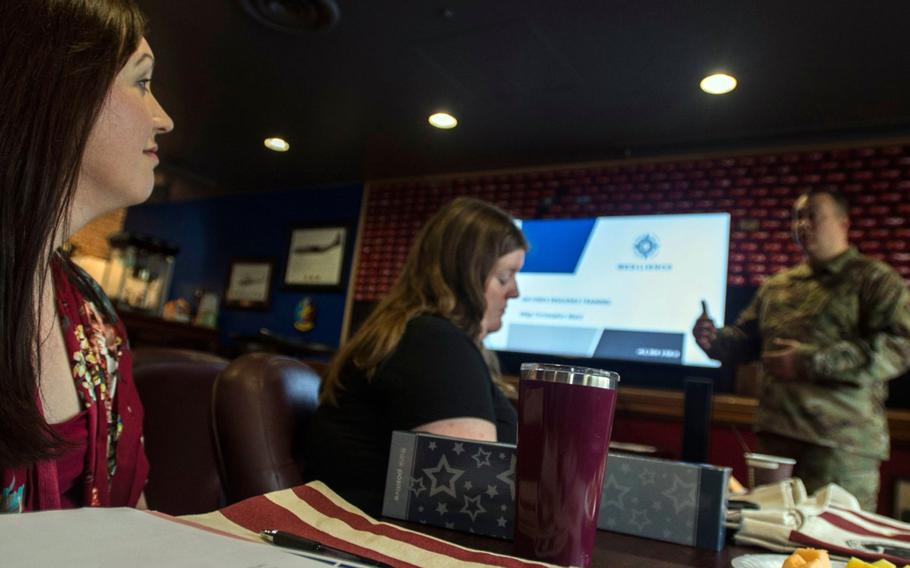
Sunshine Burgess, left, attends a resiliency workshop with other Air Force spouses at Yokota Air Base, Japan, Wednesday, Aug. 29, 2019. (Theron Godbold/Stars and Stripes)
YOKOTA AIR BASE, Japan — Spouses may spot suicidal tendencies or mental health issues that an airman hides at work, according to servicemembers and spouses involved in a resiliency workshop Thursday at the home of U.S. Forces Japan in Tokyo.
About a dozen Yokota-based Air Force spouses joined the workshop, which mirrored the sort of resiliency training airmen get, said 374th Operations Support Squadron 1st Sgt. Arthur Scruggs, who oversaw the event.
The gathering, which included sharing information on skills that help people cope while a servicemember is deployed, took place as the Air Force stands down units to focus on resiliency and suicide prevention on the orders of Chief of Staff Gen. David Goldfein.
In a video running on the American Forces Network this month, Chief Master Sgt. of the Air Force Kaleth O. Wright tells viewers that 78 airmen have died by suicide so far this year - 28 more than had taken their own lives at the same point in 2018.
Units at Yokota have been standing down this month, but the Air Force declined a request to observe the meetings.
Unit stand-downs will take place next month at Kadena Air Base, Okinawa. Three Kadena-based airmen have been found dead so far this year.
At Yokota, Scruggs and the spouses met in private but were available to speak ahead of the workshop.
Spouses see servicemembers in a different light, Scruggs said.
“They will recognize mental health issues that people at work might not see,” he said.
However, spouses sometimes tell their servicemember that their military career “is more important than mental health and that’s a mistake,” he said.
One of the spouses who participated in the workshop, Sunshine Burgess, 43, of Leland, Miss., echoed Scruggs’ comments.
“As spouses, we are going to notice if our [airman] is acting differently,” she said. “They are probably going to hide that in the workplace.”
A servicemember who attended the workshop, air traffic controller Staff Sgt. Suzi Twilley, 27, of Arcadia, Fla., said her husband, also an airman, recently deployed to the Middle East.
Twilley said she had plenty of support at Yokota during the deployment.
“The other spouses were constantly checking up on me, and my work family also checked up on me,” she said.
Resilient spouses can help airmen deal with stress at work, said Burgess, who has been an Air Force wife for 20 years.
“It is a cycle,” she said. “If the spouses are more resilient and less prone to depression it makes it easier to have a happy home. If you have a happy family life and have that kind of safety of being able to go home and get away from everything else.”
Burgess said it can be tough for spouses at overseas duty stations.
“I had my first child overseas before social media with no family around, so I have gone through what a lot of younger people will go through,” she said.
Stars and Stripes reporter Matthew M. Burke contributed to this report.
robson.seth@stripes.com Twitter: @SethRobson1